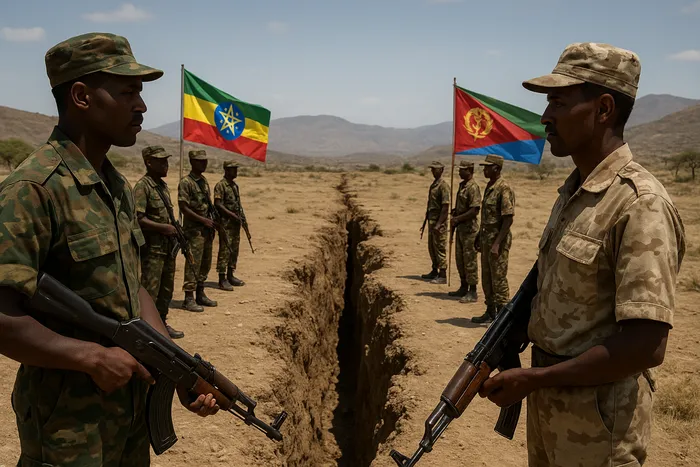Source: IOL News
Ethiopia faces renewed instability as its relationship with Eritrea rapidly deteriorates, nearly seven years after their 2018 peace accord. The peace, once a cause for celebration and a Nobel Prize, now seems superficial, overshadowed by escalating hostility, clashing geopolitical interests, and unresolved issues from the devastating Tigray War. What was once seen as a promising new era for the Horn of Africa is now at risk of reverting to a cycle of suspicion and increased militarisation.
Ethiopia’s maritime ambitions and Eritrea’s resistance
Ethiopia’s renewed tensions with Eritrea stem from Ethiopia’s assertive pursuit of Red Sea access. Having been landlocked since Eritrea gained independence in 1993, Ethiopia considers maritime access vital for its economic sovereignty. Prime Minister Abiy Ahmed’s recent public statements, emphasizing Ethiopia’s “natural right” to sea access, have reignited fears in Asmara. President Isaias Afwerki’s government perceives this rhetoric as a thinly veiled territorial claim.
Eritrea perceives Ethiopia’s diplomatic and mutually beneficial pursuit as an existential threat, largely due to its leadership’s long-standing isolation and suspicion. This stark difference in perception has reignited nationalist fervor in both nations. Consequently, state-controlled media in Ethiopia and Eritrea are now portraying each other as the aggressor. The Red Sea, once envisioned as a symbol of cooperation, has unfortunately transformed into a metaphorical line of division between the two countries.
The Tigray war and a fractured peace
The 2020–2022 Tigray War is the primary cause of the current crisis. Eritrea, despite fighting alongside Ethiopian federal forces against the Tigray People’s Liberation Front (TPLF) and suffering significant casualties, was excluded from the Pretoria Peace Agreement that ended the war. This exclusion reportedly fostered a feeling of betrayal in Asmara.
Eritrea, feeling diplomatically sidelined, has become quietly defiant, with analysts suggesting it views Ethiopia’s internal instability as a chance to regain regional influence. Ethiopia, meanwhile, grapples with unrest in its Amhara and Oromia regions, struggling to maintain a delicate federal balance and restore order within its borders.
New alliances and emerging fault lines
Ethiopian government sources claim that Eritrea has formed a secret alliance with a hardline faction of the TPLF, which was formerly a fierce adversary. If this new alignment is accurate, it highlights the constantly shifting political allegiances in the Horn of Africa, where former enemies can quickly become convenient allies. Addis Ababa alleges that Eritrea is supporting dissident Tigrayan groups and armed factions operating in the Amhara region, thereby actively destabilizing Ethiopia.
The actual veracity of these claims, whether genuine intelligence or political posturing, is unclear. Nevertheless, the rhetoric alone has been sufficient to dismantle the final vestiges of the 2018 peace agreement. Many analysts believe this demonstrates the inherent structural weakness of the Ethiopia-Eritrea relationship, which was built on the personal connection between Abiy and Afwerki rather than on established institutional trust or mutual governance frameworks.
Military posturing and the risk of escalation
Heightened troop movements and military readiness have been observed on both sides of the border, according to satellite imagery and regional reports. While a full-scale war is not expected in the immediate future, this escalation mirrors previous buildups to localized conflicts. Given that neither party wants to show weakness, even a minor event could quickly lead to wider confrontations.
The current situation is also exacerbated by domestic narratives. In Ethiopia, calls for sovereignty and access to the sea have become symbols of national pride. Simultaneously, in Eritrea, the regime gains legitimacy by resisting perceived Ethiopian expansionism. The tumultuous history of the Horn of Africa demonstrates that such rhetorical posturing can quickly overshadow diplomatic efforts.
The cost of miscalculation
Ethiopia faces a delicate balancing act: its pursuit of Red Sea access risks alienating regional allies at a time when internal unity is already precarious. The government must prioritize domestic recovery and avoid further conflict to safeguard economic reforms and political reconciliation, rather than jeopardizing them with strategic ambitions. Meanwhile, Eritrea’s continued militarization threatens to exacerbate its isolation and solidify its international image as a nation perpetually at war with its neighbors.
Regional stability hinges on both governments acknowledging that confrontation benefits neither. Constructive negotiation, potentially mediated by the African Union or trusted regional partners such as Kenya, could transform Ethiopia’s maritime vision into a cooperative economic project, rather than preceding a conflict.
A Moment of Reckoning for the Horn
The relationship between Ethiopia and Eritrea epitomizes the delicate balance between hope and crisis that has long characterized the Horn of Africa. While the 2018 peace accord briefly hinted at a new era of regional cooperation based on trust and economic ties, this promise has since eroded. Lacking sustained diplomatic efforts and robust institutional support, the peace has succumbed to deep-seated suspicion, competing ambitions, and unaddressed legacies of war.
Ethiopia and Eritrea stand at a critical juncture, facing a stark choice: to mend their fractured peace or to relive the devastating conflicts of their history. The international community, exhausted by the Horn of Africa’s perpetual strife, can only hope that sound judgment prevails, preventing a relapse into war.
Written By:
*Dr Iqbal Survé
Past chairman of the BRICS Business Council and co-chairman of the BRICS Media Forum and the BRNN
*Sesona Mdlokovana
Associate at BRICS+ Consulting Group
African Specialist







